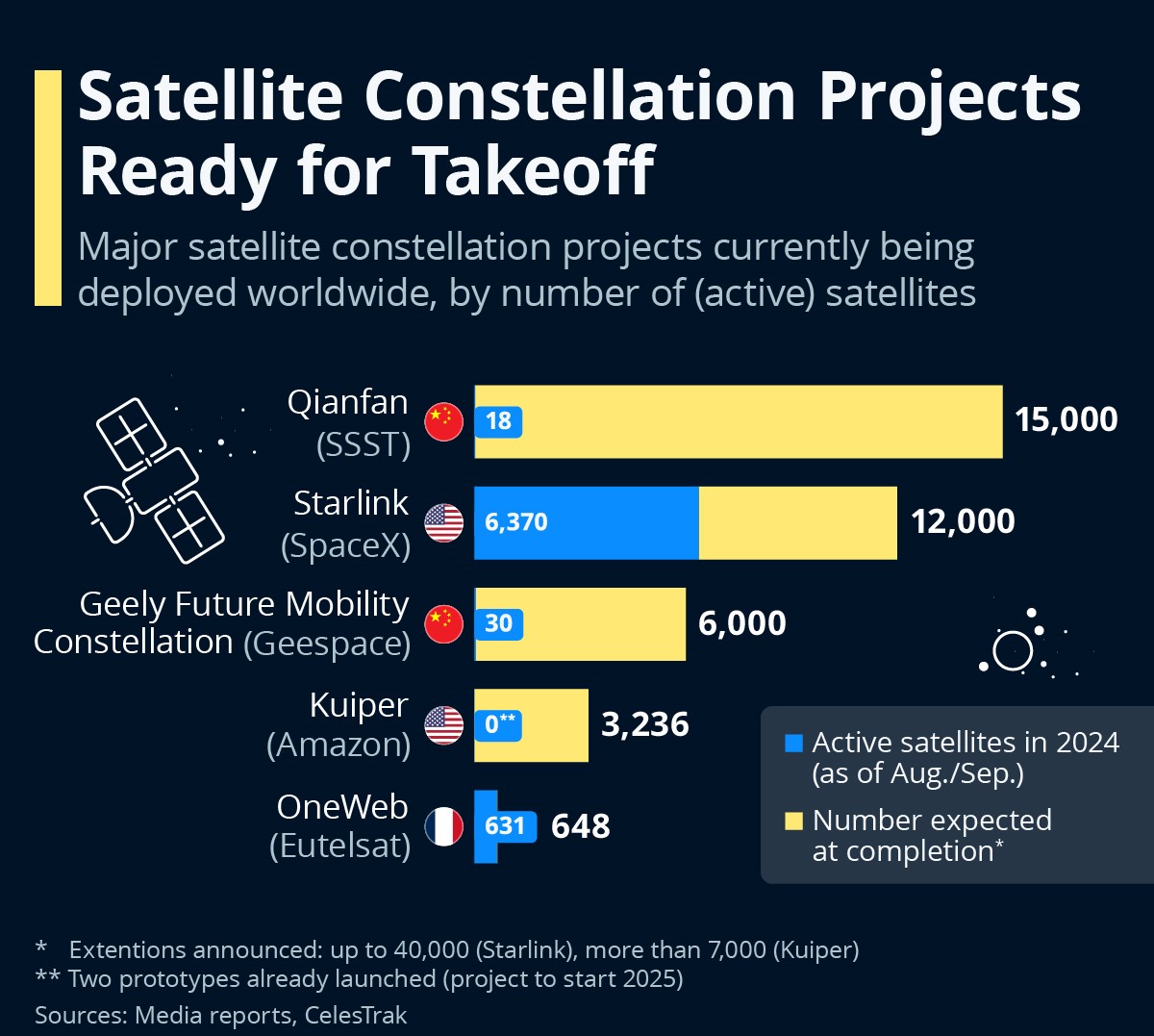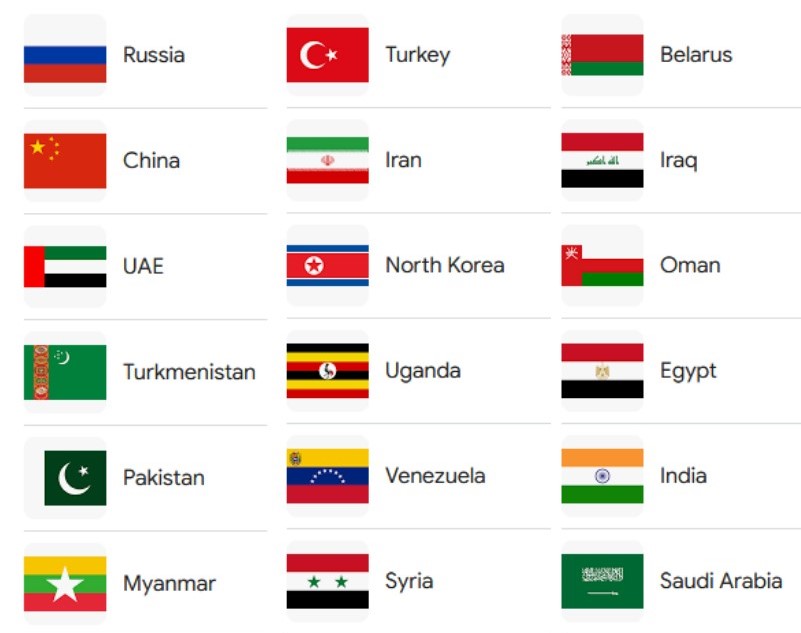Global Race to Deploy Satellite Constellations Intensifies
A recent debate in India’s telecom sector has centered around the allocation of satellite spectrum. Reliance Jio and Bharti Airtel urged India’s telecom regulator to reconsider its decision to allocate spectrum without auctioning it. On the other hand, Elon Musk, CEO of Starlink, applauded India’s move to allocate satellite spectrum directly, noting that it aligns with global best practices.
The international race to deploy satellite constellations is heating up, with major players competing to establish networks aimed at providing high-speed global internet access. Among these, SpaceX’s Starlink has become the most recognized name.
Launched in 2019, Starlink already had over 6,300 satellites in orbit as of September 2024, with plans to reach 12,000 in the coming years—or even 40,000 if an expanded deployment plan materializes. Meanwhile, Amazon is pursuing its own rival initiative, Project Kuiper, which aims to deploy more than 3,200 satellites. Following the successful launch of two prototypes in 2022, Amazon plans to begin deploying its first commercial satellites this year.

China has also entered the race with ambitious satellite internet infrastructure projects. In August 2024, Shanghai Spacecom Satellite Technology (SSST), a state-owned company, launched the first 18 satellites of its Qianfan constellation, which could grow to over 15,000 satellites by 2030. Geespace, a subsidiary of Chinese carmaker Geely, reported having 30 satellites in orbit as of September 2024, with a long-term goal of nearly 6,000 satellites.
In Europe, the French satellite operator Eutelsat has emerged as a key player in the broadband market. After acquiring the British low-Earth orbit constellation OneWeb, Eutelsat now operates the world’s second-largest satellite constellation, with over 600 active satellites. Additionally, the European Union has launched a sovereign satellite initiative named Iris2, which aims to deploy 300 broadband satellites. This project received formal approval from the European Commission on 2 September 2024.
Challenges of Rapid Orbital Expansion
While these satellite constellations promise significant advancements in global connectivity, their rapid proliferation raises critical concerns. The increasing density of satellites in Earth’s orbit poses risks of collisions and the creation of space debris. Moreover, the growing presence of satellites has sparked worries about light pollution, which could hinder astronomical research and diminish the clarity of the night sky.
As competition intensifies, striking a balance between technological innovation and sustainable space management will be vital to ensuring the long-term viability of these projects. BSNL and ISRO should consider implementing this plan nationwide, as the global race for telecommunications leadership is intensifying.
What is in it for Indian consumers?
Superior-quality service across India and seamless last-mile connectivity are key factors that excite consumers. However, with more global players entering the market soon, competition is expected to intensify, making pricing a critical factor in consumer decisions.
Recently, India joined the elite club of dictators who banned VPN services with a no-log policy. The Union government blamed terrorism for the ban. Companies that believed maintaining logs would harm their global customer base chose to exit the Indian market.

Some providers, like Avast, allowed customers to renew their subscriptions, assuming that not having offices or servers in India would enable them to offer VPN services without maintaining logs. However, users can no longer access these subscriptions. A similar situation could unfold for other VPN providers like CyberGhost, ExpressVPN, NordVPN, and others.
Laws in India are designed to protect law-abiding citizens and not to punish them. Freedom of expression and Right to Privacy are fundamental rights in India. However, the union government’s focus on cracking down on independent media, targeting journalists, and activists appears to take precedence over addressing terrorism and other criminal activities.
Every country faces the threat of terrorism, just as India does. However, nations like those in Europe, the USA, the UK, Canada, and Australia do not view VPNs as a significant threat. They prioritize the privacy of law-abiding citizens above other concerns. These countries have more transparent government policies, stricter laws, and significantly lower levels of corruption compared to India.
India is a global workplace. We have clients who are uneasy about VPNs that maintain logs and about their data on Microsoft Cloud being stored in Indian data centers. Almost every major, medium, and small tech company hires remote talent from India or maintains offices within the country.
However, India is a complex market where the union government exhibits significant insecurity, and society is deeply polarized. In India, large businesses often harass and bully smaller companies. Class, caste, and religious discrimination are pervasive, even in the corporate world.
In an effort to secure their political position, the government may employ measures that jeopardize the livelihoods of individuals who dissent from its policies, including activists and journalists. Additionally, it enforces strict censorship over media platforms capable of reaching a broad audience.
The factors mentioned in the previous paragraphs contribute to the targeting of individuals, businesses, and the freedom of expression. In extreme cases, internet access is unlawfully blocked for individuals who criticize the bureaucracy, government, or political leaders on social media.
Data stored on platforms like Google or Microsoft Drive can be compromised due to the presence of their offices in India. Almost every competitive exam question paper is leaked, and students who protest against such corruption are silenced. The union government also insists that companies from other countries appoint a grievances redressal officer in India to handle these controversial tasks.
It is an unfair situation when a country, known for corruption, seeks to censor citizens handling data that belongs to the world. A lack of sufficient checks and balances by big tech companies could result in a scenario where this data is weaponized against individuals, businesses, or even countries. These actions could be driven by factors such as caste, religion, business interests, or geopolitical considerations.
Elon Musk’s influence extends beyond his wealth; he garners a significant following by championing causes such as jobs in America, democracy, free speech, and equality. If he genuinely aligns his actions with these principles while offering Starlink services in India, it will create significant added value.
Many people would welcome Starlink offering internet in India at $10, $15, or $20 per month, particularly if it came with a no-log and no-censorship policy. If StarLink is already accountable to agencies in the USA, why should it also be subject to censorship in India? People in India would prioritize a reliable, dependable, and secure service.


